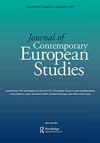Does left populism short-circuit itself? Podemos in the labyrinths of cultural elitism and radical leftism
IF 1.8
3区 社会学
Q1 AREA STUDIES
引用次数: 0
Abstract
ABSTRACTPodemos’ initial left populist strategy and electoral success have been the subject of much academic debate. However, amid the party’s rapidly declining numbers at the polls, scholarly attention towards the Spanish party has been on the wane. Based on a discussion of the existing literature and a mixture of qualitative methods, this paper attempts to capture the distinctive features of the early populist gamble and two internal elements that progressively short-circuited it. The first is related to the cultural elitism of Podemos’ leadership, a phenomenon observed especially within the faction of Íñigo Errejón, former number 2 of the party. The intellectualist distinction of many of its members proved to be a repressive instance that jeopardised the populist practice. The second is instead the return to a radical left fold, which is instead to be attributed to Podemos’ former leader Pablo Iglesias and his successor Ione Belarra. Party factionalism, strong leftist symbolism and the promotion of identity politics stand here among the most visible factors that negated the initial transversal approach. In different ways, those elements re-established the previous symbolic space that Podemos’ populism had been trying to supersede and sabotage the possibility of securing a broad and durable popular identity.KEYWORDS: Podemospopulismradical leftcultural elitismpolitical strategy Disclosure statementNo potential conflict of interest was reported by the author(s).Notes1. Due to Twitter's internal limitations, no search of tweets can access the complete history of posts, and therefore cannot generate a representative sample (see: Álvarez-Peralta, Rojas-Andrés, and Diefenbacher Citation2023, 14–15).2. The Spanish term in question is ‘compañero’, which is akin to the English ‘comrade’, but carries a milder political connotation and can also be employed as ‘fellow’. It finds frequent use within radical left circles.左翼民粹主义自身短路了吗?我们可以党在文化精英主义和激进左翼主义的迷宫中
【摘要】“我们可以”最初的左翼民粹主义策略和选举的成功一直是学术界争论的主题。然而,随着该党在民意调查中的支持率迅速下降,学术界对这个西班牙政党的关注一直在减弱。基于对现有文献的讨论和定性方法的混合,本文试图捕捉早期民粹主义赌博的独特特征和两个逐渐使其短路的内部因素。第一个问题与“我们可以”党领导层的文化精英主义有关,这一现象在该党前二号人物Íñigo Errejón派系中尤为明显。其许多成员的知识分子特征被证明是一种压迫,危及了民粹主义的实践。第二个是回归激进的左翼阵营,而这要归咎于“我们可以”党的前领导人巴勃罗·伊格莱西亚斯及其继任者伊奥内·贝拉拉。党派之争、强烈的左派象征主义和身份政治的推广是否定最初的横向方法的最明显因素。这些元素以不同的方式重新建立了“我们可以”的民粹主义一直试图取代的象征空间,并破坏了获得广泛而持久的大众认同的可能性。关键词:podemodemopopul粹主义激进左翼文化精英主义政治策略披露声明作者未报告潜在的利益冲突。由于Twitter内部的限制,对tweets的搜索无法获得完整的tweets历史记录,因此无法生成具有代表性的样本(参见:Álvarez-Peralta, rojas - andr, and Diefenbacher citation20233,14 - 15)。西班牙语中的“compañero”与英语中的“同志”类似,但政治含义更温和,也可用作“fellow”。它经常在激进的左翼圈子中使用。
本文章由计算机程序翻译,如有差异,请以英文原文为准。
求助全文
约1分钟内获得全文
求助全文
来源期刊

Journal of Contemporary European Studies
Multiple-
CiteScore
2.70
自引率
7.70%
发文量
84
期刊介绍:
The Journal of Contemporary European Studies (previously Journal of European Area Studies) seeks to provide a forum for interdisciplinary debate about the theory and practice of area studies as well as for empirical studies of European societies, politics and cultures. The central area focus of the journal is European in its broadest geographical definition. However, the examination of European "areas" and themes are enhanced as a matter of editorial policy by non-European perspectives. The Journal intends to attract the interest of both cross-national and single-country specialists in European studies and to counteract the worst features of Eurocentrism with coverage of non-European views on European themes.
 求助内容:
求助内容: 应助结果提醒方式:
应助结果提醒方式:


